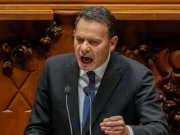Portugal , Mar 12, 2025 Portugal is currently gripped by a significant political crisis following Prime Minister Luís Montenegro’s failure to secure a parliamentary confidence vote. This pivotal moment has plunged the nation into uncertainty, raising questions about the stability of the current government and the potential for new elections. The recent parliamentary session highlighted deep divisions within the Portuguese political landscape, with Montenegro’s minority government struggling to garner sufficient support.
The confidence vote, a crucial test of the government’s mandate, exposed the fragility of the political alliances within the parliament. The inability to secure a majority vote has fueled speculation about Montenegro’s potential resignation and the subsequent need for a snap election. This political turmoil has significant implications for Portugal’s economic and social policies, potentially stalling crucial reforms and impacting investor confidence.
Analyzing the root causes of this Portugal Political Crisis, it’s clear that the lack of a stable majority has been a persistent challenge for Montenegro’s administration. The opposition parties have capitalized on this weakness, creating a challenging environment for governance. The current situation underscores the complexities of coalition politics and the importance of cross-party dialogue.
The coming days will be critical in determining the future of Portugal’s government. The nation now faces the prospect of prolonged political instability, which could have far-reaching consequences. As the Portugal Political Crisis unfolds, citizens and international observers alike are closely monitoring the developments, anticipating the next steps in this rapidly evolving situation.










